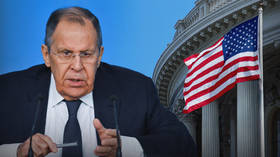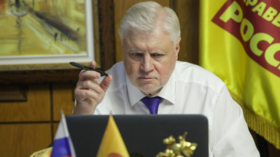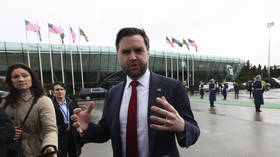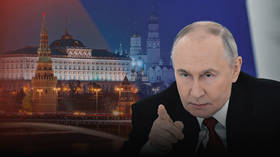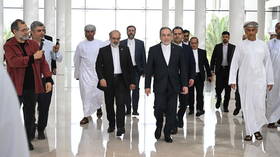It’s official: RT is the enemy
The Chairman of the Broadcasting Board of Governors, overseeing US media directed at foreign audiences, says his organization needs more money to fight its enemies. Namely, Russia, Iran, Venezuela and China.
The head of the media organization which oversees America's international broadcasting has labeled RT, Press TV and CCTV as its “enemies”.
“We can't allow ourselves to be out-communicated by our enemies,” said Walter Isaacson, chairman of the Broadcasting Board of Governors. “You've got Russia Today, Iran's Press TV, Venezuela's TeleSUR, and of course, China is launching an international broadcasting 24-hour news channel with correspondents around the world [and has] reportedly set aside $6 -10 billion dollars – we have to go to Capitol Hill with that number – to expand their overseas media operations.”
Maybe Isaacson really did not mean to offend Russia… or China…
But Josh Rogin, a staff writer at Foreign Policy Magazine, said it was clear what Isaacson was saying at the time. “He didn’t identify any Afghanistan media organizations as being enemies. I wouldn’t even know what they would be if he’s talking about them. He said Iran, China, Venezuela, Russia,” said Rogin. He added: “The overall point here is that he views the American international broadcasting efforts as in competition with, what he calls, autocratic regimes and he includes Russia in that list. That’s certainly not the same as the Obama administration’s official policy and it’s not the same as what the BBG has been saying for many years.” Rogin explained that the BBG is going through an identity crisis. “They have two conflicting missions. One is to report the news objectively and the other is to be a tool of American foreign policy,” said Rogin. He said that overall, the conflict does not speak well for the “objectivity and credibility” of the news organizations. Professor Christopher Simpson, the author of the book "The Science of Coercion", believes there are at least two levels of the situation. “The shallow level is that the director of this organization, who is in charge of Voice of America, which is a State Department outlet, gave a poorly considered and poorly constructed speech in which he said exactly what he was quoted as saying,” he told RT. “But that organization is now trying to back track and they are arguing that now it’s not what he meant at all, he was referring to Al Qaeda, and so forth and so on. Nevertheless the tape is clear enough…” “The deeper problem is that the organizations that are in charge of US information and pro-agenda policy… are in a crisis,” the writer added. “It’s financial crisis and it’s a credibility crisis.” “The problem that they’re facing is the message that they have about how the world is supposed to work is not resonating, is not gathering traction,” said Simpson, “Their message simply does not work as well as it used to.” “This has nothing to do with journalism. It’s about soft power and pushing the American policy agenda,” echoes RT political commentator and Crosstalk host Peter Lavelle. “It looks like the chairman is a little worried that the world isn’t believing him or his organization anymore. They are catching up.” Instead of focusing on providing the audience with facts and maybe a new perspective on things, Isaacson is waging media wars, notes Lavelle. “He treats anyone who is a competitor as an enemy. 20 years after the end of the Cold War, one has to wonder whose mentality has changed and whose hasn’t,” he added. As for the timing of the statement, Peter Lavelle suggested that, among other things, it is related to the economic situation in the US. “He is saying ‘Look at our competitors – they are pouring money into soft power, into alternative journalism.’ And into the truth, I would say,” said Lavelle, adding that this scares Walter Isaacson. Andres Izarra, the president of TeleSUR, also targeted by Isaacson, said there is nothing new for Venezuela in this latest development. “There is a media war that we’ve been dealing with for many years now and TeleSUR is a part of that response to the dominance of the US media in addition of the US media around the world. It’s not surprising that the BBG chairman would say that,” said Izarra. “The world is changing and now new game players have come into the international arena and those new game players are communicating as well and are setting up their own media operations to let their voices be heard,” added Izarra. In the past US legislators have sought to block TeleSUR, referring to it as a network which promotes terrorism. “Venezuela is a democratically elected government. We certainly do not promote any agenda that’s different to democracy, on the contrary,” said Izarra. He argued the increase in competition and rise of new voices is a threat to the dominance of the US. “The empire is being contested; it’s being competed in their own speech, in their own media, in their own terrain you have this kind of response,” added Izarra. He said his objective is to give a voice to Latin America and he does not see TeleSUR as an enemy of the US or of Voice of America or other US media brands. “I think it’s very clear to everyone that has some kind of critical view that the Voice of America is a propaganda operation by the US,” said Izarra. There is a well-worn adage on Capitol Hill that the best way to raise money from Congress is to scare them. Walter Isaacson apparently wants a lot of money to fight America’s enemies in the media. “American broadcasting is mostly a commercial system that has a wide global footprint that goes to every corner of the global, including Hollywood films and the like. No nation really can compete with that. They don’t have the money, or the marketing and the distribution. So, he focuses on government broadcasting,” said RT contributor and media critic Danny Schechter. He argued that Isaacson is trying to have it “all ways”. “He’s trying to be patriotically correct for the Congress. He’s trying to be journalist correct for his colleagues and the two are not really merging here. It’s really surprising because Walter Isaacson was the head of CNN, TIME Magazine, The Aspen Institute; he’s a very thoughtful person. But, for him to get into the gutter here and really basically go after other outlets assuming that because a government gives money for it, it’s therefore government propaganda, that isn’t really true in my experience of RT, Press TV, or even TeleSUR for that matter. So, this is a way to tarnish your competitors and label them unfairly,” said Schechter. But getting the US message across is costly. The agency that Walter Isaacson heads is called the Broadcasting Board of Governors. It manages mainly radio stations, including Voice of America and an unpopular Middle-Eastern TV channel. On all this it spends more than $750 million. That is way more than the budget of Russia Today, Iran's Press TV, Venezuela's TeleSUR combined. So perhaps money does not fully make up for global media clout. Mr. Isaacson says that truthfulness will make the difference, and as he says, “Truth is on our side,” meaning on America’s side. And it is that statement that raised an alert with some freedom of speech advocates: “If someone says the truth is on the US side, he’s propagandist and not a journalist, and I think it’s a bad example for other countries, because obviously other countries have their perspectives. Many times US media is slanted toward the US – even the private media,” said Ivan Eland from the Independence Institute. The credibility of the Broadcasting Board of Governors was under even more scrutiny when reports came out about the White House influence on the BBG reporting after the Iranian presidential election. “He’s in conflict with Obama administration which is trying to make better relationships with Russia and China,” stated Danny Schechter, “And now he is calling Russia and China an enemy” “This, from a diplomatic viewpoint, was very-very foolish,” said Christopher Simpson. Isaacson’s speech seams to stand at odds with the US positioning itself as a champion of free speech. Now Washington will have to get used to the increasing volume from independent media voices giving a fresh perspective on world issues.Shaking the money tree


